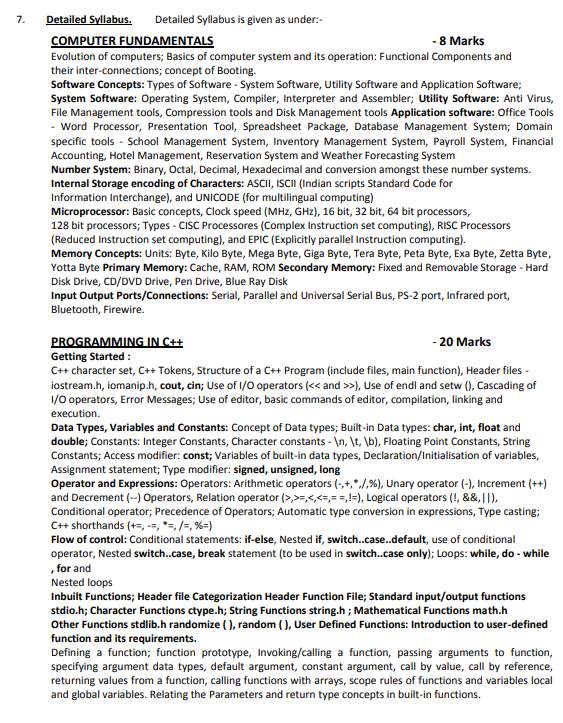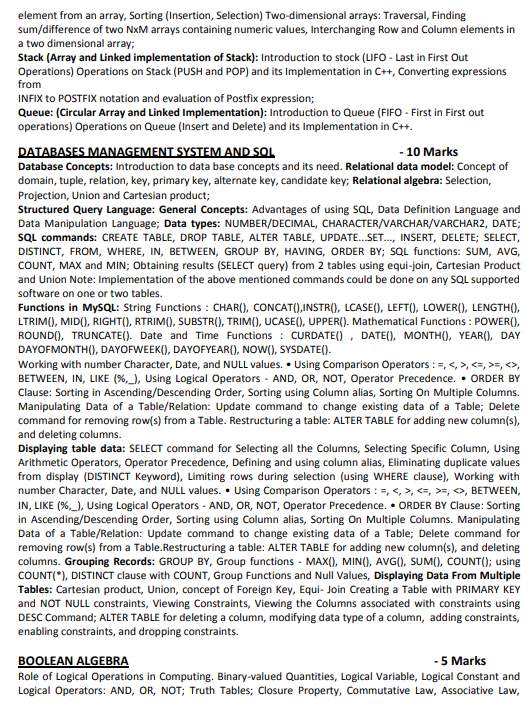| Re: PGT Computer Science Syllabus
Here I am giving Kendriya Vidyalaya Sangathan (KVS) Post Graduate Teacher (PGT) exam syllabus:
Computer Systems Architecture
1. THE COMPUTER SYSTEM
System buses: Computer Components, Computer function, Interconnection Structures, Bus Interconnection, PCI.
Internal Memory: Computer Memory System Overview, Semiconductor Main Memory, Cache Memory, Advanced DRAM Organization.
Input/ Output: External Devices, I/O Modules, Programmed I/O, Interrupt- Driven I/O, Direct Memory Access, I/O Channels and Producers, The External Interface.
Operating System Overview.
2. THE CENTRAL PROCESSING UNIT
Computer Arithmetic: The Arithmetic and Logic Unit (ALU), Integer Arithmetic, Floating-Point Representation, Floating-Point Arithmetic.
Instruction Sets: Characteristics and Function, Machine Instruction Characteristics, Types of Operands, Types of Operation, Addressing Modes and Formats, Register Organization, The Instruction Cycle, Instruction Pipelining.
Assembly Language
The Control Unit: Micro-operations, control of the CPU, hardwired Implementation, Micro program Controller, Basic Concepts, Microinstructions, Sequencing, Microinstruction Execution. Reduced Instruction Set Computer: An Introduction
OPERATING SYSTEMS
Introduction: System software, resource abstraction, OS strategies; multiprogramming, batch, time sharing, personal computers and workstation, process control & real time systems, processes & threads using FORK, JOIN, QUIT.
Operating System Organization: Factors in operating system design, basic OS function, implementation consideration: process modes, kernels, methods of requesting system services, device drivers Device Management: Service management approaches, buffering, device drivers, performance tuning.
Process Management: System view of the process and resources, initiating The OS, process address space, process abstraction, resource abstraction, process hierarchy.
Scheduling: Scheduling Mechanisms, Strategy selection, non-pre-emptive and pre emptive strategies.
Synchronization Principles: Interactive processes, critical section, deadlock, coordinating processes, semaphores, spread memory, multiprocessors, events, monitors and the inter-process communication.
Deadlocks: System deadlock model, prevention strategies, hold and wait, circular wait, allowing pre-emption, Banker’s Algorithm, serially reusable resources, consumable resources, general resources system recovery.
Memory Management: Mapping address space to memory space, memory allocation strategies, fixed partition, variable partition, segmentation.
File Management: Directory structure, basic file operations and their implementation. Protection and Security: Policy mechanism, authentication, internal access authorization.
DIGITAL ELECTRONICS
Fundamental Concepts: Digital signal, NAND, NOR and Exclusive-OR operation, Boolean Algebra, Basic Digital Circuits.
Number system and Codes: Primary, Octal, Hexadecimal, Signed Numbers Codes, hamming codes.
Combinational Logic Design: K-map representation of logical functions and simplification using K-map of 4 and 5 variables, Quine- McCluskey’s method. Multiplexers, Demultiplexers, Adders and Subtracters, multipliers, Comparators, Parity generators and checkers, Code converters, Priority Encoders, Decoders. Races, hazards, and asynchronous behavior
Flip-Flops: Clocked RS flip flop, D-type flip flop, Excitation table of flip flop, Edge triggered flip flop, Clocked flip flop design.
Sequential Logic Designs: Registers, Shift registers, Asynchronous counters, synchronous counters, RAM, ROM.
PROGRAMMING FUNDAMENTALS
Basic Computer Organization: Functional Units, basic I/O devices and storage devices; Representation of integers, real (fixed and floating point), characters (ASCII and Unicode); Basic operations of a programming environment. Problem Solving Approaches: Notion of an algorithm, problem solving using top-down design and decomposition into sub-problems, stepwise methodology of developing an algorithm, methodology of developing an algorithmic solution from a mathematical specification of the problem, use of recursion for problems with inductive characterization. Programming using a modern programming language such as Java,
emphasizing the following notions: Building blocks: arithmetic and logical expression, variables, assignment; Specifying the input-output interface (type); control structures including sequencing, conditionals, loops,procedural abstractions (procedures, methods); basic data structures-integers, reals, strings and arrays-and internal representation of scalar and vector data; data abstraction and encapsulation-objects, classes and packages; input/
output of data. Numerical and non-numerical applications using above concepts.
For detailed syllabus here is attachment:
|



